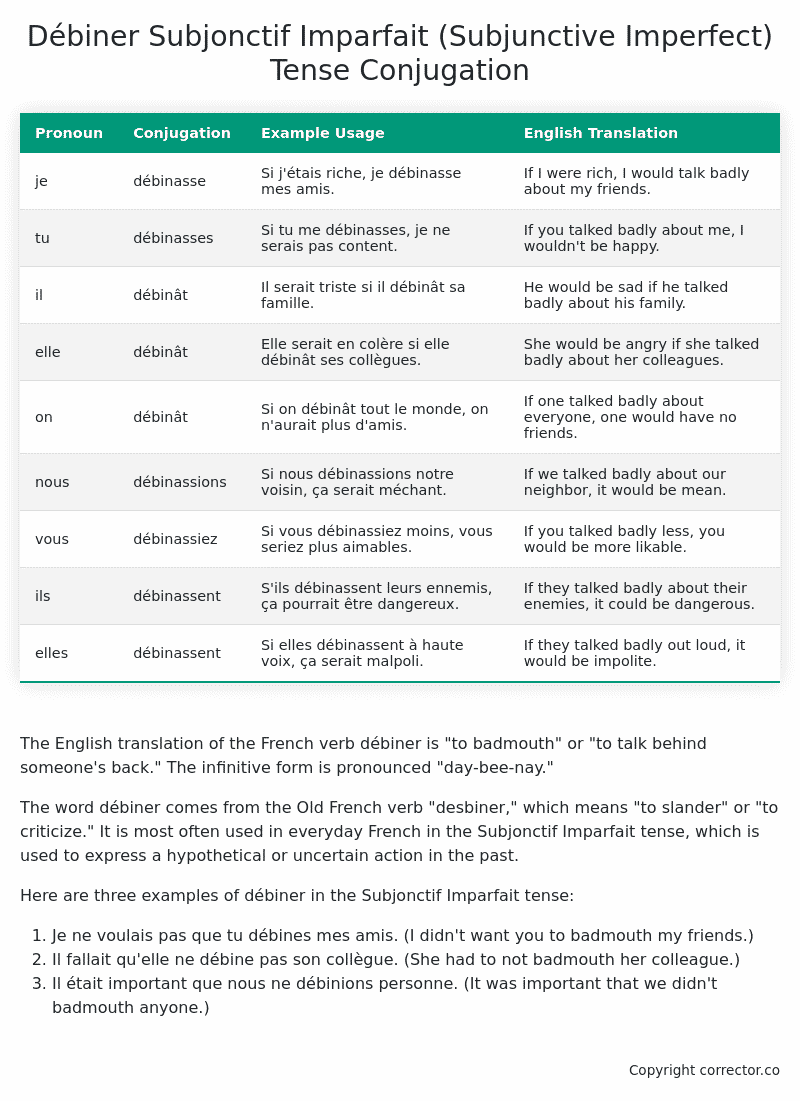Subjonctif Imparfait (Subjunctive Imperfect) Tense Conjugation of the French Verb débiner
Introduction to the verb débiner
The English translation of the French verb débiner is “to badmouth” or “to talk behind someone’s back.” The infinitive form is pronounced “day-bee-nay.”
The word débiner comes from the Old French verb “desbiner,” which means “to slander” or “to criticize.” It is most often used in everyday French in the Subjonctif Imparfait tense, which is used to express a hypothetical or uncertain action in the past.
Here are three examples of débiner in the Subjonctif Imparfait tense:
- Je ne voulais pas que tu débines mes amis. (I didn’t want you to badmouth my friends.)
- Il fallait qu’elle ne débine pas son collègue. (She had to not badmouth her colleague.)
- Il était important que nous ne débinions personne. (It was important that we didn’t badmouth anyone.)
Table of the Subjonctif Imparfait (Subjunctive Imperfect) Tense Conjugation of débiner
| Pronoun | Conjugation | Example Usage | English Translation |
|---|---|---|---|
| je | débinasse | Si j’étais riche, je débinasse mes amis. | If I were rich, I would talk badly about my friends. |
| tu | débinasses | Si tu me débinasses, je ne serais pas content. | If you talked badly about me, I wouldn’t be happy. |
| il | débinât | Il serait triste si il débinât sa famille. | He would be sad if he talked badly about his family. |
| elle | débinât | Elle serait en colère si elle débinât ses collègues. | She would be angry if she talked badly about her colleagues. |
| on | débinât | Si on débinât tout le monde, on n’aurait plus d’amis. | If one talked badly about everyone, one would have no friends. |
| nous | débinassions | Si nous débinassions notre voisin, ça serait méchant. | If we talked badly about our neighbor, it would be mean. |
| vous | débinassiez | Si vous débinassiez moins, vous seriez plus aimables. | If you talked badly less, you would be more likable. |
| ils | débinassent | S’ils débinassent leurs ennemis, ça pourrait être dangereux. | If they talked badly about their enemies, it could be dangerous. |
| elles | débinassent | Si elles débinassent à haute voix, ça serait malpoli. | If they talked badly out loud, it would be impolite. |
Other Conjugations for Débiner.
Le Present (Present Tense) Conjugation of the French Verb débiner
Imparfait (Imperfect) Tense Conjugation of the French Verb débiner
Passé Simple (Simple Past) Tense Conjugation of the French Verb débiner
Passé Composé (Present Perfect) Tense Conjugation of the French Verb débiner
Futur Simple (Simple Future) Tense Conjugation of the French Verb débiner
Futur Proche (Near Future) Tense Conjugation of the French Verb débiner
Plus-que-parfait (Pluperfect) Tense Conjugation of the French Verb débiner
Passé Antérieur (Past Anterior) Tense Conjugation of the French Verb débiner
Futur Antérieur (Future Anterior) Tense Conjugation of the French Verb débiner
Subjonctif Présent (Subjunctive Present) Tense Conjugation of the French Verb débiner
Subjonctif Passé (Subjunctive Past) Tense Conjugation of the French Verb débiner
Subjonctif Imparfait (Subjunctive Imperfect) Tense Conjugation of the French Verb débiner (this article)
Subjonctif Plus-que-parfait (Subjunctive Pluperfect) Tense Conjugation of the French Verb débiner
Conditionnel Présent (Conditional Present) Tense Conjugation of the French Verb débiner
Conditionnel Passé (Conditional Past) Tense Conjugation of the French Verb débiner
L’impératif Présent (Imperative Present) Tense Conjugation of the French Verb débiner
L’infinitif Présent (Infinitive Present) Tense Conjugation of the French Verb débiner
Struggling with French verbs or the language in general? Why not use our free French Grammar Checker – no registration required!
Get a FREE Download Study Sheet of this Conjugation 🔥
Simply right click the image below, click “save image” and get your free reference for the débiner Subjonctif Imparfait tense conjugation!

Débiner – About the French Subjonctif Imparfait (Subjunctive Imperfect) Tense
Formation
Common Everyday Usage Patterns
Interactions with Other Tenses
Subjonctif Présent
Indicatif Passé Composé
Conditional
Conditional Perfect
Summary
I hope you enjoyed this article on the verb débiner. Still in a learning mood? Check out another TOTALLY random French verb conjugation!


